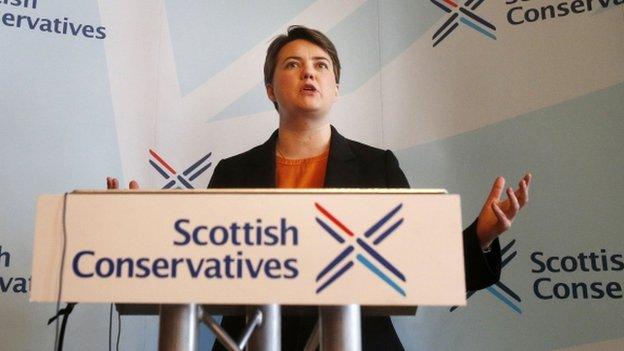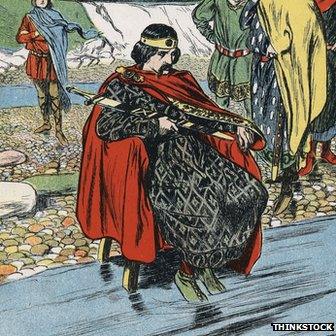What are the Tories up to?
- Published

So just what are the Tories up to? With their Holyrood tax plan, that is.
Firstly, it should be said that being up to something, anything - and being paid considerable attention - is, relatively speaking, something of a novelty for the Scottish Conservatives in their present reduced state.
The Better Together campaign has many facets - but one of them is that it gives a substantial platform to the Tories in Scotland.
Which is, of course, precisely why Labour in Scotland is proving so assiduous in stressing its own distinctive contribution, set apart from the combined campaign.
But there is much more to this Tory plan. Lord Strathclyde and his team contrived to keep their plan simple - basically, devolve income tax - to grab the attention, to offer a coherent marketing tool and to give the Tories a dog in the race, barking eagerly.
'Emollient pooch'
In responding to the plan, Ruth Davidson, the Conservative leader, contrived to sound both confident and consensual. Add a little soothing compliance to that canine barking.
In response to Ms Davidson, the Prime Minister says the package is "a clear, confident and Conservative blueprint" for the future of Scotland. A deftly choreographed sequence of statements.
Note that description "Conservative". This is not the outline for a pan-Unionist offer. It goes further than Labour if not as far as the Lib Dems.
So are the Tories seeking to trump Labour over devolved powers? The emollient pooch is back, wheedling sinuously. Of course not. What a thought, Brian. The very idea.

Is Ruth Davidson a modern-day King Canute?
OK, but still the talk is not of opening negotiations in search of common ground. Rather, the talk is of this being the Conservative offer in the Conservative manifesto for a putative Conservative victory at the next UK General Election.
One senior Tory says that point concentrated minds. To the effect that the Tories would actually be expected to deliver this. That Ruth Davidson did not fancy a role as a 35-year-old Alick Douglas-Home, promising a better plan only for that to be dumped by others in office.
Which brings an understandable retort from the SNP. To the effect that the Tories did indeed promise improved devolution in 1979 - with a subsequent absence of implementation.
Ancient history, say the Tories. We are the party of devolution now. The party of devolution within the Union. To quote the document, "the party of the Union." That phrase set out in bold.
Bringing us back to my opening question: what are the Tories up to? Just why has Ruth Davidson reversed her "line in the sand" opposition to further devolution?
Several points arise here. Firstly, that stance was during the leadership contest, in contradistinction to a rival who wanted to scrap the existing Tory Party and recreate afresh. Secondly, the reversal was completed long since in principle, in a series of speeches. This is the practical outcome.
Thirdly, there is political calculation here rather than simple obeisance to the will of the people. It might be said that Ruth D. is fed up being a latter day King Canute, bidding the waves go back. (It would be wrong in that King Cnut (so properly called) was trying to demonstrate the limits of kingly power, not the stubborn resistance of water under lunar influence. But set that aside.)
The Tories see gain here in three ways.
Firstly, they appear - once again - to be swimming with the tide of Scottish popular opinion. Their document has been welcomed, in part, by both the LibDems and Devo Plus.
Secondly, it allows them in Scotland to make a feasible offer to cut spending and thus tax, within the wider ambit of a broad tax base. That was not serious with the limited Tartan Tax. In that respect, today's position is a logical development of Tory thinking.
Thirdly, it allows them in England to argue that in future the Scottish Parliament will be responsible for a substantial chunk of revenue raising as well as spending. It allows the PM to say: the Scots now raise their own taxes, I have ended the days of subsidy.
I know, I know, trust me, I know - the subsidy argument is very strongly and very substantively contested by Nationalists and others. Rather than fact, this is about inchoate political perception. Village hall audiences in England think the Barnett formula is largesse on the scale of the South Sea Bubble. This gives the PM an answer.
'Offer in place'
Does that mean the Barnett formula is doomed, if the Tories have their way? Speaker after speaker at the Tory launch in Glasgow said no. That Barnett would now be responsible for a smaller percentage of Scottish spending because the Scottish block grant is squeezed - but that its basic configuration need not change.
Well, maybe. But the Tories are also talking about a method of conjoining the sundry Parliaments and Assemblies in these isles in search of common positions, in search of fairness.
They see that as part of the "glue" that binds the Union together. It could also, ultimately, be the pathway to a Treasury-led assessment of spending need across these islands. Remember that Barnett is disliked in Wales on the grounds that it short-changes them.
In response, the SNP and the Scottish Government say that the various offers from the pro-Union parties are too disparate to be trustworthy. The Greens urge us to consider what is excluded from the Tory offer, rather than what is included. Collectively, they say only a Yes vote in September will give Scotland more clout.
If that happens, Scotland is destined for independence. If not, the Tories now have their offer in place.